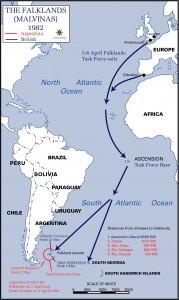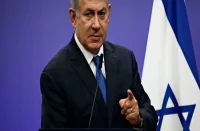On 11 June 1982, Charles Haughey, then Irish PM (Taoiseach), had described the friendly duel in Falkland Island as “a ridiculous war”. After more than thirty years, tensions are rising, with some looking at the prospects of a fresh war over the Island territory – a return to the heydays of “nineteenth-century colonialism”. In a bizarre move – about 15 days before 2012 Christmas – Britain named 169,000 square miles of disputed land on Antarctica as “Queen Elizabeth II”.
Argentina, that also claims rights over the same of territory, condemned UK’s actions. The Argentine President Cristina Fernández de Kirchner, published an open letter to David Cameroon (as advert in UK Newspapers- Guardian and Independent) asking him to return Falkland Islands to Argentina. Cameron retorted with an advert in Argentinean media, reasserting UK’s sovereign rights over Falklands.
Blame it on democracy – is the line that the Western media is taking to explain Cristina’s complaints that “Argentina once again in under attack from the ‘vulture’ funds and from others, 12.000 kilometres away that are threatening to come to militarize and invade our Malvinas Islands”.
However, what the media is not connecting up is that Argentina is once again in the process of being blessed by weapon Gods. By 2015, Argentina’s defence market will be $5.5bn. The naval component of its defence budget is likely to increase “from the average of 25.3% of the country’s total defence budget between 2006 and 2010, to 25.5% over the years to 2015.”
By 2017, America will begin the delivery of 128 F-15C and F-15E Strike Eagle fighters. Argentina has also ordered Landing Craft Air Cushion Vehicles (LCACs) – hovercraft and also the latest version of the Mirage F1 air to air fighter aircraft from France and there are amphibious warfare oriented Hind gunships in the pipeline from Russia.
The Americans with a peculiar penchant to fish in troubled waters have added a fresh dimension to the old dispute by now coming out with the fact that in 1982, the CIA “may have inadvertently encouraged the Argentineans to invade the Falkland Islands.” The debates are once again revolving around the thickness of Regan- Thatcher relationship in the 1980s.
Notwithstanding, the inter-war US support for UK – what is more important is the US behaviour prior to commencement of hostilities? Did it encourage Argentine Junta to go ahead with the plans to invade Falkland?
America had ample leverages to halt the onset of war. By the end of 1982, “the debt crisis was center stage, with Argentina, Mexico and Brazil struggling to avoid default on a collective foreign debt of $200 billion.” ( Daily Mail)
Both London and Washington were aware of the dubious military transactions that Israeli secret service, Mossad was entering with Argentina – supplying “fuel tanks, gas masks, radar alert systems to detect incoming missiles, duvet jackets, spares and even Shafir air to air missiles.” And even Mirage IIIB/C aircraft using Peru, Luxembourg and the Swiss bank accounts. (Merco Press) The question is why did the US-UK nexus in financial and arms markets not control the outbreak of war?
 During the 1982 Falkland fiasco Nicholas Henderson Britain’s ambassador to Washington was trying hard to convince – Jeane Kirkpatrick, US ambassador to the United Nations and Thomas Enders, US Assistant Secretary for Latin American Affairs – to refrain from encouraging Argentina to occupy Falkland Island. In one of the cables to London, comparing Kirkpatrick with Enders, the British diplomat had reported, “Whereas the latter is more fascist then fool, Kirkpatrick is more fool than fascist. She appears to be one of America’s most reliable own-goal scorers: tactless, wrong-headed, and ineffective.”
During the 1982 Falkland fiasco Nicholas Henderson Britain’s ambassador to Washington was trying hard to convince – Jeane Kirkpatrick, US ambassador to the United Nations and Thomas Enders, US Assistant Secretary for Latin American Affairs – to refrain from encouraging Argentina to occupy Falkland Island. In one of the cables to London, comparing Kirkpatrick with Enders, the British diplomat had reported, “Whereas the latter is more fascist then fool, Kirkpatrick is more fool than fascist. She appears to be one of America’s most reliable own-goal scorers: tactless, wrong-headed, and ineffective.”
Looking at the events that unfolded in 1982 – the phrase ‘fascist and fool’ is a more apt description of the Argentinean “strongmen and caudillos” – General Leopoldo Galtieri, and Admiral Jorge Anaya – than the two North American diplomats. The popular narrative that locates and limits the Falkland war in the internal political dynamics of Buenos Aries tells us that Admiral Anaya was the main architect of Argentina’s Falkland fiasco. The story goes that the Admiral had conceived Falkland operation as a young captain, after reading about the relatively easy and successful Goa operations that India had achieved against the Portuguese colonizers in 1960. Incidentally, Anaya’s prolong stint as naval attaché in London had failed to douse his desires to defeat the British colonialism. In fact, the Admiral’s confidence flowed from the fact that he had Lynx helicopters and Type 42 warships with the £ 45 million that the British Foreign Secretary David Owen had grated them in 1979.
If American diplomats were pygmies, the Argentinean military men were pawns in the whole game. Fooled by their spiritual and military mentors in Vatican and Washington respectively, the gullible duo plunged their nation into a senseless war in Las Malvinas that Galtieri named as Op Rosario – in honour of the Virgin of Rosario.Besides, the pygmies and pawns – the war-drama enacted some 8000 miles from London – had the powerful pair of Thatcher-Reagan as the chief protagonist and Pope John Paul II as the character actor.
The Argentina’s Catholic Church was also using “strong religious rhetoric to identify itself with, and reinforce support for, the military dictatorship’s Falklands adventure.”
The conflict with strong religious overtones had a happy ending with Pope John Paul II’s entry into Buenos Aries on 10 June 1982, just a week after his visit to Great Britain (that was ostensibly was ostensibly changed from “political to pastoral,” by Margret Thatcher). Prior to handing over the Pink slip to Galtieri, the Pope showered on him abundant kisses and “warm papal words”.
In the US strategic calculus, Galtieri had outlived his utility. Notwithstanding the general’s “majestic” performance in the ‘dirty war’ and his hand in disappearance of 30,000 Marxists from Buenos Aries, it was time for the so-called democracy to show its face in Argentina. But to achieve such a simple goal the Washington would not have jeopardized its special relationship with London.
While the Falkland war was still on, on 8 June 1982, Reagan became the first US President to address the British Parliament where he praised the English boys for taking on the responsibility of fighting little wars in distant lands to prevent bigger conflicts and rebellions within the capitalist core. Regan could not afford to see London as the “sick man of Europe”. In Early 1980s, the British Parliament was asking for massive defence cuts to the tune of £500m (that were finally restricted to £200m only). This was also the time when President Regan was gathering support all over Europe for his “plan and a hope for the long term — the march of freedom and democracy which will leave Marxism-Leninism on the ash-heap of history.” The continuity of Thatcher was important as Reagan could not trust the Labour leaders at that juncture in history.
Thatcher’s unique relationship with Regan gave her the sixth sense to see the final outcome of the war much before it could end. In some sent and unsent telegrams to Galtieri, Thatcher wrote, “In a few days the British flag will be flying over Port Stanley. In a few days also your eyes and mine will be reading the casualty lists,” Her unsent telegram for the Argentine General that probably was kissed by the Pope, was even more clairvoyant, “On my side, grief will be tempered by the knowledge that these men died for freedom, justice and the rule of law. And on your side? Only you can answer that question.”
Sure enough, Thatcher’s predictions were accurate. The war brought about Galtieri’s down fall and gave the Margret Thatcher a second term after the 1983 general elections to push her privatization agenda further. The Americans projected Thatcher as the ‘Iron Lady’ praising her “firm and immediate decision to retake the Island and down played their own to be that of an “Assistant Supply Sergeant”.
The 1982 Falkland war was a useless one only for those concerned with loss of 1000 odd human lives. But for Regan, Thatcher, the arms industry, it was hardly a frivolous war. In fact, the money markers were the biggest winners in war. After the military takeover in 1976, Buenos Aries’ foreign debt had galloped from about US$7 billion in 1976 to over US$46 billion in 1983. The 1982 war was designed to push Argentina’s further into a debt trap and this was achieved in a holy manner.
The author is an international relations expert based in New Delhi. He is the editor of a monthly magazine Purple Beret. He can be contacted at atul.beret@gmail.com














To the point. But unfortunately, wars are avoidable necessity.